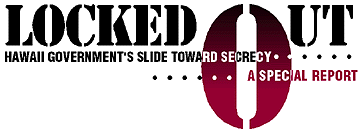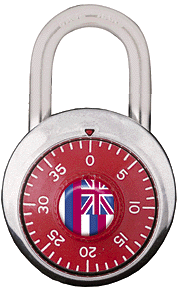
"In a democracy, the people are vested with the ultimate decision-making power. Governmental agencies exist to aid the people in the formation and conduct of public policy. Opening up the governmental processes to public scrutiny and participation is the only viable and reasonable method of protecting the public's interest. Therefore, the legislature declares that is the policy of this state that the formation and conduct of public policy - the discussions, deliberations, decision, and action of governmental agencies - shall be conducted as openly as possible."

 Government efficiency vs. the public's right to open government.
Government efficiency vs. the public's right to open government.The issue, debated 21 years ago when the state Sunshine Law was passed, was hot in the Legislature again this year with passage of a law making it easier for members of state and county boards and commissions - including county councils - to meet privately.
The amendments have widened the gap between government officials who feel constrained by the Sunshine Law and citizen groups that clamor for accountability.
"It's a battle which anybody concerned with government should be there fighting," said Desmond Byrne, chairman of Common Cause Hawaii.
Open-meeting advocates see the Sunshine Law as a key element of democratic government. Citizens can't effectively monitor their government if the government is acting in secret, they say. It's that same law, however, that some in government say interferes with getting the job done.
University of Hawaii Regent Joseph Blanco said the Sunshine Law, before it was changed, fostered inefficiency because it prevented regents from gathering informally to discuss UH business.
For example, when UH President Kenneth Mortimer needed feedback on his plans to deal with cuts to the UH law and medical schools, Mortimer called each regent individually. Although it would have been easier for him to meet with them informally, Blanco said that would have been illegal.
"The president has got to report to each of us what his findings were because you can't report these things on the board and you can't go into executive session to discuss them," said Blanco.
"And it's the kind of information we need to discuss frankly about in order to try and manage the university well."
Members of boards and commissions favor private discussions, saying they promote candid talk without worry that it will be taken the wrong way in public or reported in the media.
That, in turn, they say, makes government more efficient at setting public policy.
But critics say some inefficiency is the price of democracy. Arlene Kim Ellis, past local president of the League of Women Voters, believes the public's right to government proceedings outweighs the need for private talks.
Such meetings, Ellis says, leave people guessing how decisions - and the deals that go along with them - are made.
And it's too bad if openness slows the process, she said.
"We have to have one or the other and I think the other is more important. I think openness is much more important" than the machinery of government, she said.
By law, boards can hold closed sessions by a two-thirds vote of its members to discuss personnel, hiring, dismissal, discipline, litigation, labor negotiations, criminal misconduct and public safety.
Regents regularly hold closed sessions to evaluate the president or discuss labor negotiations with the faculty union, while the Honolulu City Council Policy Committee goes behind closed doors to review lawsuits against the city. The Aloha Tower Development Corp. - the state entity overseeing development of the waterfront marketplace - routinely holds closed sessions to discuss legal matters involving the marketplace developer and lender.
Boards are required to let the public know when such meetings are held. Notices must be filed with the lieutenant governor's office or the county clerk at least six days before any meeting.
And no matter what is discussed, the law requires that all votes be taken in public.
"The Sunshine Law applies as equally to county boards and commissions as it does to the state boards and commissions," said state Deputy Attorney General Charlene Aina, who heads the office's Sunshine Law committee.
"If there's lack of symmetry with that, it is in respect with the Legislature," which, along with the judiciary, is exempt from the law, she said.
Byrne contends the playing field is tilted toward government because there isn't enough public involvement, save the handful of citizen groups.
And when there is support, the public usually focuses on specific issues and not open government as a whole, he said.
"To me, they're (the public) faced with an uphill struggle unless we constantly promote openness in government," Byrne said.
Aina reports there aren't any recent cases where the attorney general has prosecuted board officials for disregarding the law. For any conviction - which is a misdemeanor punishable up to a year in prison - members must have willfully violated the law. And that is hard to prove.
The BOE
Last February, the Board of Education was considering whether to endorse state Superintendent Herman Aizawa's priorities for funding student programs.
Before the meeting, the Star-Bulletin printed the list of programs on the chopping block. About 100 members of the public showed up at the meeting to testify against the list, and the board ended up shelving Aizawa's proposal.
During the meeting, Aizawa complained about the list having been published, saying someone must have "leaked" it to the Star-Bulletin. But the priority list was public information, available before the meeting, because it was on the agenda.
Aizawa denied that his comments about "leaks" meant he would have preferred making the funding decisions without public input. He said he had simply forgotten that the list was public information.
UH / Legislature
When House Higher Education Chairman Sam Lee (D, Mililani-Waipio) wanted to convene a meeting with regents last spring to discuss UH budget issues, Chairman Joseph Blanco replied that the board couldn't meet with him unless they posted a public meeting notice.
So what Lee did to avoid notifying the public, said Blanco, was to host the talk in the state Capitol. Since the Legislature is exempt from the law, Lee wasn't required to post a notice that regents were gathering to discuss official business.
"If we're called on to sit down with legislators to kind of talk story about how this bill is going to impact us, if we called the meeting, then we couldn't do it," Blanco said.
"But if they called the meeting, then they could do it. We used to play these little things like having others call meetings," he said.
Employees Retirement System
At a public board meeting of the state Employees' Retirement System on June 10, Associated Press correspondent Bruce Dunford was denied a copy of a letter by investment consultant Ron Payton that was discussed at the meeting, documents which are public record.
Board officials, on the advice of Deputy Attorney General Katherine C. Desmarais, refused to make a copy of the letter available, telling Dunford - who had a deadline to write the story that evening - to ask the state Office of Information Practices for an opinion on whether a copy should be released.
Housing and Finance
Development Corp.In April, the state Housing and Finance Development Corp. debated a staff recommendation for a $132 million Kapolei housing project.
Although members discussed the recommendation, the agency refused to release a copy of it.
Once the board approved the project, the agency provided a copy. Agency spokesman George White said the state should keep such matters secret so that it can negotiate effectively.
Desmond Byrne of Common Cause Hawaii says documents discussed at an open meeting should be available to the public.
Office of Hawaiian Affairs
Office of Hawaiian Affairs Trustee A. Frenchy DeSoto in March considered a coup to unseat OHA chairman Clayton Hee after he humiliated her at an earlier meeting. DeSoto had called an unpublicized meeting with four other trustees to get their reactions to a possible coup attempt.
"Well, we all met in violation of the Sunshine Law," she said.
"It was Billie Beamer, Moanike'ala Akana, Kinau Boyd Kamalii, Moses Keale and myself. And we all talked about there needs to be some things addressed at our level," DeSoto had said.
Honolulu City Council
Honolulu City Council Chairman John DeSoto called a closed meeting on Jan. 12, 1995, to discuss personality clashes on the nine-member Council.
The Council met privately at 10 a.m. that day - in Desoto's office - to discuss its bitter reorganization following the November 1994 city elections. That meeting, however, did not fall under any of the reasons that allow a government body to meet privately.
DeSoto defended the hourlong session as his job to "squash" personality problems that aren't in the best interest of the public.